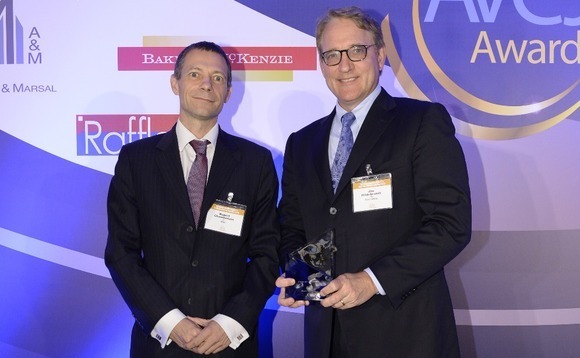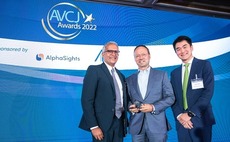
AVCJ Awards 2015: Firm of the Year: Bain Capital

Bain Capital enjoyed its most active year in Asia as positive experiences from previous deals and proactive engagement with entrepreneurs helped deliver a string of new investments
Bain Capital's dialogue with Hiroshi Hashimoto began four years ago. He had created one of Japan's largest traditional inn and hot spring chains, accumulating establishments as the 1980s boom turned to 1990s stagnation, prompting a string of sell-offs. With 29 spas and resorts nationwide, Oedo-onsen was an example of consolidation and professionalization. It was also essentially a sideline to Hashimoto's circuit board manufacturing interest.
"The business had gotten to the scale where he thought he couldn't really run it himself and he wanted to transition to a long-term owner and get some liquidity for his family," says David Gross-Loh, a Japan-based managing director with Bain.
The private equity firm was introduced to Hashimoto by a mutual acquaintance who recognized the potential match. This led to years of discussions as Hashimoto repeatedly weighed the possibilities, reluctant to let go of a business that had seen a 30% increase in sales growth since 2007 and was generating JPY35 billion ($284 million) in revenue. Finally, in March of this year, a deal worth JPY50 billion, including debt, was agreed.
Bain sees opportunities for further consolidation within the industry, having identified hundreds of individual properties that might be available. It also wants to attract more international visitors. To Gross-Loh, the deal also stands as testament to the effort made cultivating local relationships.
"It's a cumulative effort - you meet lots of companies, you build relationships, it takes time," he says. "I feel in the last several years we have hit our stride and we are seeing the fruits of that investment. It has helped our deal flow and we are finding attractive opportunities. In 2015, we've had a number of proprietary deal successes across Asia that came from relationships we built several years ago."
Incremental approach
Bain's history in Asia has been characterized by measured expansion. The first pan-regional fund, which closed in 2007 at $1 billion, focused on just China and Japan. Four years later, Fund II came in at $2.3 billion, with Australia and India added to the mix. The geographic remit has expanded once again for Fund III as Southeast Asia and South Korea were included in a vehicle that is said to have a target of $2.5 billion and a hard cap of $3 billion.
At the same time, the private equity firm has taken steps to develop a more proactive deal-sourcing template for the region. "If you look at some of our markets, they are highly intermediated and deals tended to be auction-centric. It's not easy to get great deals in highly competitive situations," says Amit Chandra, an India-based managing director with the firm. "Finding a way to move away from that as much as possible was a strategic imperative."
This template is tailored to fit the realities of different geographies and Chandra describes Japan as the market in which Bain has moved furthest. "Most situations are proprietary and we have known the sellers for a long period of time and often we are the only people talking to them," he explains.
Oedo-onsen is one of three Japan deals completed in 2015. Bain also acquired Japan Wind Development for JPY9.7 billion and paid around JPY9.5 billion for Yukiguni Maitake, a mushroom producer. Both were tender offers for publicly-listed companies, relationships and business needs were a greater consideration than method of acquisition.
In the case of Yukiguni Maitake, it had run into trouble after rolling out a somewhat experimental production technology that failed to deliver and ended up eating into the company's profit. A new CEO was brought in but the founder retained significant equity ownership and influence, and the banks were uncomfortable with the governance situation. Bain bought the company, took out the existing the creditors and brought in new banks to provide financing.
It is an open question as to whether, as recently as five years ago, the banks would have pushed as hard as they did. There is equal uncertainty as to whether private equity would have been acceptable to the various stakeholders as a form of replacement capital.
"Historically, they might have tried to bring in a friendly company or another group company, but those buyers are fraught with difficulty because they are slow-moving, they don't know if they can run the company, and there are often cultural differences," says Gross-Loh. "Private equity becomes a logical solution - we move fast, we are independent, we are friendly to the banks, and there is more certainty. That is an option now that didn't exist or wasn't given as much consideration five years ago."
Bain had already been looking at potential acquisitions in the fresh produce space and had spoken to several of Yukiguni Maitake's competitors, so when this opportunity presented itself there was sufficient domain knowledge in place. But the key factor in this and other transactions, is how the opportunity was presented: introductions by respected third parties who know of Bain's track record in the market.
Oedo-onsen is perhaps the most vivid example of track record triggering deal flow. The aforementioned mutual acquaintance thought Bain would be a good fit for Hashimoto's company because of the work it had done on casual dining chain Skylark. While the business models differ, there are similarities in terms of the kind of professionalization of management required, and Gross-Loh says this resonated with Hashimoto.
When Bain acquired Skylark for JPY160 billion in 2011, the company was going through one the rougher patches of its 40-year history. It had been bought by its previous private equity owner during the boom market of 2006 and failed to live up to the ambitious numbers. Bain helped turnaround the business and has since realized around JPY140 billion through an IPO in October 2014 and a supplementary share sale earlier this year. It still holds a substantial minority stake.
"Skylark has been a really important case study that people can't ignore. It was a very large transaction and there were doubters, but we took a different engagement approach with management and it checked all the boxes in terms of being a successful transformation of a well-known branded business," says Gross-Loh. "In many ways Skylark was typical of a lot of Japanese businesses - innovative and well-positioned, but inefficiently run and not focused enough on operational excellence."
Certainly, the Bain playbook for Skylark is similar to those used before and since. First, the management team was bolstered with the appointment of several key foreign executives. Then standards and tracking metrics were introduced so the company could establish where it was making money, benchmark its cost structures against industry peers, and identify ways to improve margins.
With Skylark, particular attention was paid to customer service in order to address issues such as waiting times and consistency in the quality of food preparation across the outlets. Table arrangements were reconfigured, productivity went up, wait times went down, and the company reported improved customer satisfaction scores and seeing steady same store sales (SSS) growth for the first time in several years. Then Bain embarked on the third leg of its strategy: expansion.
Show your value
The notion of a strong case study creating new investment opportunities is not unique to Japan. Chandra notes that Indian entrepreneurs increasingly ask private equity firms to provide evidence of the operational improvements they claim to be able to make. This not only involves supplying case study materials, but also making executives from current and former portfolio companies available to the entrepreneurs for questioning.
"It is not ‘I'm a large global investor with money to invest in India,'" Chandra says. "The conversation is about their industry, how we can help with their supply chain issues, how we can bring working capital down, how we can improve their strategic effectiveness in particular markets. Then they say, ‘Connect me to someone who can give an example of how you did this,' and you facilitate those conversations."
As a result, negotiations can focus less on price and more on what the target company wants from an investor. "We have to figure out what their sensitivities are and we then look for a deal that addresses their needs and our needs," says Jonathan Zhu, a managing director with Bain in China. "Their needs would include price, deal certainty, and if they remain a shareholder, ability to grow the business. We need to be able to buy into a business at a reasonable valuation so we can achieve a good return."
This dynamic does not remove the necessity of auctions in the likes of India, China and Australia - some markets are just highly intermediated by nature - although proactive deal-sourcing can either preempt a process or swing the odds in Bain's favor.
Chandra condenses the five-year evolution of the firm's India sourcing strategy into three deals. The first was Genpact, a business processing outsourcing company in which Bain acquired a 30% stake for around $1 billion in 2012. The firm researched the industry and Genpact was consistently identified as best in class, leading to informal talks with management and the owners, General Atlantic and Oak Hill Capital. When those two PE investors decided to exit part of their stake they wanted a simple process and so reached out to just two parties. Bain was one of them.
This deal was followed in 2013 by the acquisition of The Blackstone Group's stake in Emcure Pharmaceuticals. Bain registered its interest very early on and when the company pulled back from a domestic IPO in order to stay under private ownership for longer, it was the only interested party to engage in serious negotiations.
L&T Finance Holdings, a unit of engineering conglomerate Larsen & Toubro, followed a similar path: Bain spent several years cultivating a relationship with the owner, negotiated a $199 million investment on a proprietary basis, and was therefore well ahead of the pack when other groups expressed an interest. While not the only party involved in these processes, engagement was bilateral or within a limited auction.
"There are still people who prefer wide auctions but increasingly we see a preference for particular capability sets," says Chandra. "There was a time, around 2007-2008, when capital was looked at as a complete commodity. But some people have realized that private capital has its value in the characteristics of who provides it, and there are some investors who are better suited to you from cultural and capability reasons."
Top-down, bottom-up
These deal-sourcing efforts are underpinned by five industry verticals that Bain explores globally and for which it has dedicated teams. In China and Japan - still the Asian markets where the firm's bench is deepest, with around 25 people apiece - there are country teams covering consumer-retail, healthcare, industrials, financial and business services, and technology, media and telecom. The Japan team includes four senior executives who only assist with deal-sourcing.
Nevertheless, the nature of the opportunities that emerge from broad local networks is difficult to predict. As Bain's experiences in China suggest, the traditional top-down approach of sector teams is best deployed in tandem with bottom-up work by investment professionals on the ground.
For example, the firm had been looking at leasing businesses and was therefore aware of Lionbridge, which spun out from a local industrial equipment manufacturer, a Bain executive heard through a former university classmate that the Lionbridge's new sponsor was looking to divest. This opened the door to a proprietary deal that closed last October. Meanwhile, Rise Education started out as a potential growth deal in 2012 before a disagreement between the founders turned it into a control investment one year later.
As for VXI, a call center operator that serves multinational and Chinese clients, Zhu has known one of the founders for more than 20 years - but it wasn't until relatively recently that he considered to be a business that Bain would invest in. "In 2011, I could see it scaling and thought it might become interesting, and in 2012 VXI had grown to a size suitable for Bain Capital and the founder wanted to bring us in," he says. "They never considered any other investor."
Latest News
Asian GPs slow implementation of ESG policies - survey
Asia-based private equity firms are assigning more dedicated resources to environment, social, and governance (ESG) programmes, but policy changes have slowed in the past 12 months, in part due to concerns raised internally and by LPs, according to a...
Singapore fintech start-up LXA gets $10m seed round
New Enterprise Associates (NEA) has led a USD 10m seed round for Singapore’s LXA, a financial technology start-up launched by a former Asia senior executive at The Blackstone Group.
India's InCred announces $60m round, claims unicorn status
Indian non-bank lender InCred Financial Services said it has received INR 5bn (USD 60m) at a valuation of at least USD 1bn from unnamed investors including “a global private equity fund.”
Insight leads $50m round for Australia's Roller
Insight Partners has led a USD 50m round for Australia’s Roller, a venue management software provider specializing in family fun parks.








